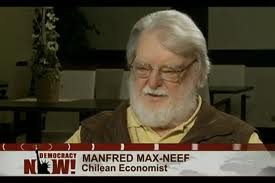 “Economists study and analyze poverty in their nice offices, have all the statistics, make all the models, and are convinced that they know everything that you can know about poverty. But they don’t understand poverty.”
“Economists study and analyze poverty in their nice offices, have all the statistics, make all the models, and are convinced that they know everything that you can know about poverty. But they don’t understand poverty.”
— Manfred Max-Neef
We highly recommend this interview with Chilean economist Manfred Max-Neef for economics teachers. It could be used in teacher education programs or shared by teachers in a social studies department. It would also be interesting to evaluate district economics standards or economics textbooks against the principles outlined in the excerpt from Max-Neef’s talk below.
Manfred Max-Neef is interviewed by Amy Goodman of Democracy Now! He won the Right Livelihood Award in 1983, two years after the publication of his book, From the Outside Looking In: Experiences in Barefoot Economics.
Interview Excerpt
AMY GOODMAN: And if you’re teaching young economists, the principles you would teach them, what they’d be?
MANFRED MAX-NEEF: The principles, you know, of an economics which should be are based in five postulates and one fundamental value principle.
One, the economy is to serve the people and not the people to serve the economy.
Two, development is about people and not about objects.
Three, growth is not the same as development, and development does not necessarily require growth.
Four, no economy is possible in the absence of ecosystem services.
Five, the economy is a subsystem of a larger finite system, the biosphere, hence permanent growth is impossible.
And the fundamental value to sustain a new economy should be that no economic interest, under no circumstance, can be above the reverence of life.
AMY GOODMAN: Explain that further.
MANFRED MAX-NEEF: Nothing can be more important than life. And I say life, not human beings, because, for me, the center is the miracle of life in all its manifestations. But if there is an economic interest, I mean, you forget about life, not only of other living beings, but even of human beings. If you go through that list, one after the other, what we have today is exactly the opposite.
AMY GOODMAN: Go back to three: growth and development. Explain that further.
MANFRED MAX-NEEF: Growth is a quantitative accumulation. Development is the liberation of creative possibilities. Every living system in nature grows up to a certain point and stops growing. You are not growing anymore, nor he nor me. But we continue developing ourselves. Otherwise we wouldn’t be dialoguing here now. So development has no limits. Growth has limits. And that is a very big thing, you know, that economists and politicians don’t understand. They are obsessed with the fetish of economic growth.







Twitter
Google plus
LinkedIn